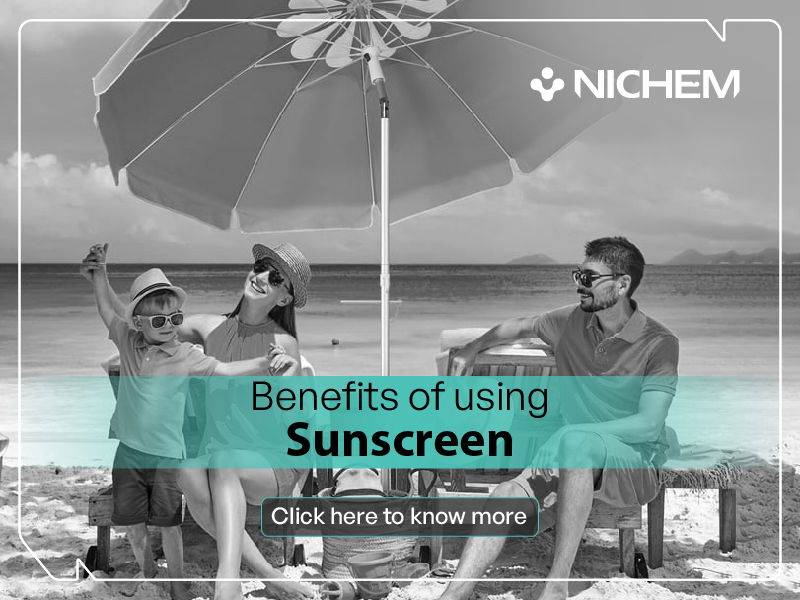We are living the hottest years on record due to the effect of climate change and global warming. Global warming and climate change have increased the average temperature everywhere around the world. In addition to this, the depletion of the ozone layer has also reduced the natural protection offered against the harmful rays of the sun by the atmosphere. The need to protect your skin against the heat is then the most practical and sensible thing to do. Sunscreens can help you in achieving this goal.
Sunscreen: Your aid in the fight against harmful UV rays
The harsh Ultraviolet rays of the sun can cause sunburn and affect the appearance and growth of your skin. Exposure to the sun over long periods can make your skin tanned, wrinkled or sunburned. It is hence necessary to protect your skin from the harmful UV rays of the sun.
There are two types of UV radiations: Ultraviolet A (UVA) and Ultraviolet B (UVB). UVA rays have longer wavelengths and are responsible for skin ageing. Although less intense than UVB, the UVA rays penetrate the deeper layers of the skin. UVB rays have shorter wavelengths and are associated with skin burning. Unprotected exposure to these rays can damage the DNA in skin cells and lead to genetic defects, mutations, skin cancer and premature ageing.

Source: BeBeautiful.in
Research shows that most of the cases of melanoma, a type of skin cancer, are due to exposure to UV radiation from the sun. Regular use of sunscreen can prevent skin cancer and other harmful effects due to exposure to the sun.
Choosing correctly: Types of Sunscreens and their pros and cons
There are two different types of sunscreen activities available based on their mechanism to filter out UV rays and protect skin from damage: mineral sunscreen and chemical/organic sunscreen.
Mineral sunscreens: Mineral sunscreen provides full protection against UVA and UVB rays. These types of sunscreens stay on top of the skin’s surface to create a physical barrier. Due to this, they are effective as soon as they are applied. They are also less likely to clog your skin pores.
They contain inorganic physical UV filters like titanium dioxide and zinc oxide that reflect, scatter and block the UV rays before they penetrate your skin. These physical blockers are designed to sit on top of your skin. However, this also means they get easily removed due to sweating, rubbing or rinsing. Hence, frequent reapplication is necessary.
Other disadvantages of mineral sunscreens include a white cast on the skin. They are thicker and hence difficult to apply.
Chemical/organic sunscreens: Chemical sunscreens absorb into the skin and sit on the deeper layers of the skin. They contain carbon-based active ingredients that absorb UV rays and turn them into heat and then release this heat. These kinds of sunscreens allow the UV rays to penetrate the skin until they are absorbed. As a result, they may not protect against all UVA rays. On the other end, chemical sunscreens are thinner and easier to spread on the skin. However, they take about 15-20 minutes to be effective, due to which it is necessary to plan their application beforehand.
Factors to consider - what you should look for in sunscreen
Let’s discuss some factors what to look for in a Sunscreen.
Broad spectrum protection: A broad-spectrum sunscreen can protect you from both UVA and UVB rays. This can help you protect your skin from early skin ageing, sunburn and skin cancer.
Sun Protection Factor (SPF): An important metric to consider while choosing sunscreen is the Sun Protection Factor (SPF). It is a relative measure of how long a sunscreen will protect your skin from UV rays. Experts recommend sunscreen with an SPF value between 30 and 50 for daily use.
PA ++++ Ratings: The PA++++ rating system indicates your sunscreen’s ability to protect you against UVA rays (which are responsible for premature skin ageing and increased risk of skin cancer). The more “+” signs a sunscreen has, the higher its UVA protection, so choosing a sunscreen with a PA++++ rating will ensure a complete defence against harmful UV radiation, preventing long-term skin damage and age-related concerns like wrinkles, dark spots, and uneven skin tone.
Water resistance: Water resistance is also a desirable trait if you are looking for a sunscreen for daily use. Water resistance ensures that the sunscreen offers protection on a wet skin for long periods of time. This ensures that you do not have to reapply sunscreen frequently.
Skin type: Do remember to consider your skin type while buying a sunscreen. This is necessary especially if you have sensitive or acne prone skin. Checking for reviews from reliable sources or other users can make sure that you buy a sunscreen suitable for sensitive skin that doesn’t aggravate your skin problems.
Besides the factors mentioned above, good sun protection habits like wearing hats and sunglasses are always helpful alongside the use of sunscreen. An effective sunscreen can make your skincare routine complete. In addition to sunscreen’s benefits for skin, it can also save you and your family from harmful skin conditions that can jeopardise their wellbeing. At a time when the global average temperatures and skin-related conditions are on the rise, a sun protection routine is not just a good cosmetic choice, but the need of the hour.
About NICHEM
Long-standing Specialty Chemicals player with ISO 9001:2015 certification and a history of providing specialty solutions for over 25 years. The company is headed by senior chemical industry specialists with combined expertise of more than 100 years. With an emphasis on eco-friendly, non-toxic products, the company’s primary strength is research, development, and customization. More information on NICHEM can be found at https://nichem.solutions.


